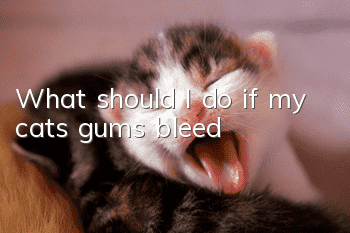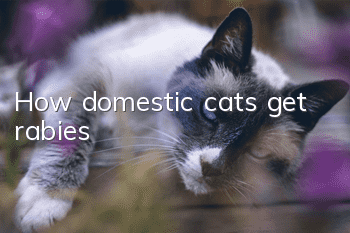What should I do if my cat’s gums bleed?

The oral cavity is a door for cats. Many germs and microorganisms can be introduced from the oral cavity and cause internal diseases of the body. As the saying goes, diseases enter from the mouth. If we clean and care for the oral cavity regularly, it will be quite effective. It is the first step to prevent and control diseases. Of course, for cats, the mouth sometimes produces some symptoms of disease. So, what should owners do at this time?
Bleeding gums are sometimes caused by gum inflammation such as gingivitis and periodontitis. If the symptoms worsen, the cat will lose appetite due to gum pain and become weightless. In addition, gum bleeding caused by rodenticide poisoning also exists. Therefore, you should observe your cat’s condition more carefully.
1. Gingivitis
If you find that the kitten is depressed and unwilling to eat, and if you open its mouth and look at it, you will find that the gums are dark red, and there are symptoms such as edema, bad breath, drooling, and difficulty chewing. That can almost tell that the kitten’s gums are inflamed. Gingivitis can occur in cats due to dental calculus, foreign matter or bacterial infection of the gingival sulcus. To prevent cats from suffering from gingivitis, in addition to brushing your cat's teeth regularly, if you find any abnormality in the gums, you should immediately go to the pet hospital to seek help from a doctor.
Severe gingivitis can even lead to the death of cats. It is not unexpected. Given the sensitive nature of cats, if their mouths feel pain, they will naturally refuse to eat. The consequences can be imagined. Oral health care for cats is very necessary. Cat owners should usually choose cat food with a teeth-cleaning effect for their cats. If the cat can cooperate, they should choose appropriate oral health care products and go to the pet hospital regularly to have the cat's health checked by a pet doctor. Oral status.
2. Periodontitis
When gingivitis further invades around the roots of the teeth, it becomes periodontitis. The clinical symptoms include cats losing a lot of weight, eating intermittently, not daring to eat hard food, having difficulty chewing, and screaming in severe pain when food occasionally touches the lesion. An unpleasant odor comes from the mouth. Affected cats resist oral examinations. During the oral examination, it can be seen that there is calculus attached to the teeth, the teeth are loose, the teeth are congested and swollen, and there is obvious pain when the affected teeth are touched with instruments.
How to treat?
1. Thoroughly remove dental calculus, and necrotic teeth and teeth that have lost tooth function should be extracted.
2. Rinse the mouth with disinfectant, 0.1% potassium permanganate water or 3% boric acid water. Then apply 2% iodine glycerin or tin powder or ice boron powder. For teeth with hyperplastic granuloma, 10% silver nitrate can be used for corrosion.
3. Supportive therapy. For cats with reduced appetite, glucose and compound saline should be infused intravenously, and oral vitamin B preparations should be given.
4. Provide highly nutritious liquid food.
The tissues supporting the teeth are destroyed, and the roots of the teeth are exposed. Red, swollen and bleeding gums, the teeth become loose and eventually fall out. If it reaches this state, the cat needs medical treatment. In addition, it is also important to use a toothbrush or gauze to remove tartar. Check your cat’s teeth carefully every time.
3. Rodenticide Poisoning
Rodenticide contains warfarin, which can cause gum bleeding if cats accidentally eat it. Preying on rats that have eaten rat poison can also lead to poisoning. This situation requires medical treatment, so take the cat to the hospital as soon as possible. In addition, it is also important to pay attention to the storage of medicines to avoid such accidents.
Rat poison poisoning has different treatment methods depending on the ingredients. Here are some common treatment methods.
1. Poisoning by endocrine rodenticides
This is a powerful rodenticide, a white, odorless crystalline powder, which causes the permeability of pulmonary capillaries to increase and a large amount of plasma to enter the lung tissue, causing pulmonary edema. After a few minutes to a few hours after the cat ingests it, it will cause vomiting, foaming at the mouth, diarrhea, coughing, difficulty breathing, depression, and visible mucosal cyanosis. Foamy bloody mucus oozes from the nostrils. Coma and drowsiness usually occur 10 to 12 hours after ingestion, and a few die within 2 to 4 hours after ingestion. There is no specific antidote for this poisoning. Methods of inducing vomiting, gastric lavage, catharsis and diuresis can be used.
2. Poisoning by organofluoride rodenticides
This is a highly poisonous drug. The sick animals will become restless, vomit, have gastrointestinal hyperfunction, run around, bark, and have paroxysmal spasms of the whole body for about 1 minute after eating it, and finally die.
Treatment can be performed by intramuscular injection of fluorine, 0.1-0.2 grams per kilogram of body weight. The first dosage is 1/2 of the whole day's dosage, and the remaining 1/2 is divided into 4 parts and injected once every hour. Combined with inducing vomiting and gastric lavage. Feeding raw egg whites to cats can help protect the mucosa of the digestive tract. Intravenous injection of 5-10 ml of calcium gluconate is beneficial.
- How to comfort a cat with irritated fur?
- What is the function of cat meat pads?
- Why is the cat shivering after vaccination? Is it a drug allergy?
- Why do I have soft stool after eating canned Miao Xian Bao?
- Precautions for internal and external deworming of cats
- How does a cat adapt to its new home when it first arrives?
- Cat plague will get better after a few days
- Can cats with autism heal themselves?
- Kitten eating habits: feeding frequency is the key
- Small animal ophthalmic emergencies and treatment - overview



